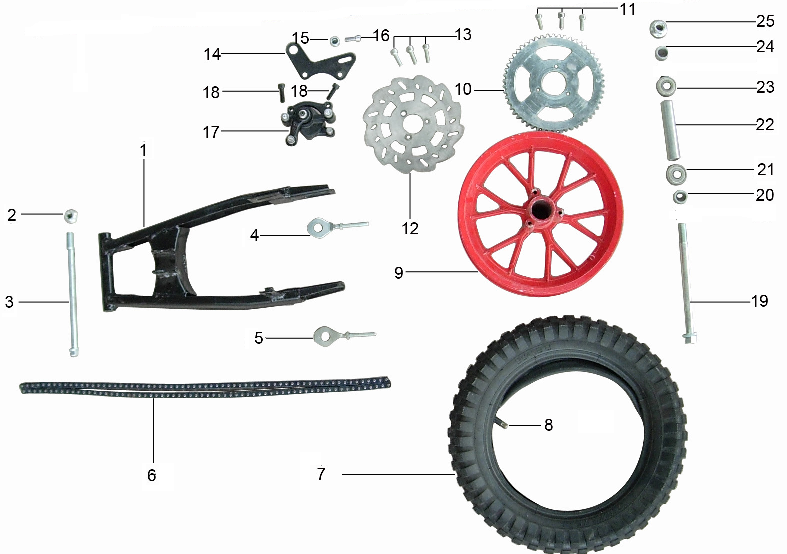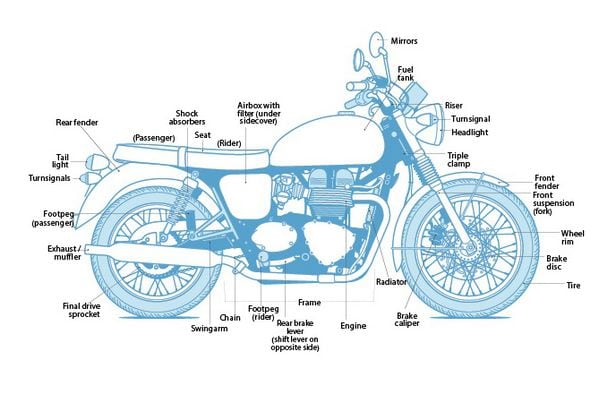Do You Really Need OEM-Spec OEM Parts New Zealand?
Do You Really Need OEM-Spec OEM Parts New Zealand?
Blog Article
Discover the Essential Motorcycle Parts You Need for Ideal Efficiency
Comprehending the crucial parts of a motorbike is essential for attaining peak performance. Each part, from the engine to the stopping system, plays a crucial role in general capability and security. Routine upkeep can prevent unexpected failings and enhance the riding experience. Nonetheless, several cyclists ignore the intricacies of these systems. Discovering just how they interact can lead to a more efficient trip. What crucial parts should every rider focus on?
The Engine: The Heart of Your Motorcycle
The engine serves as the core element of a bike, driving its performance and defining its capabilities. It is in charge of transforming fuel right into mechanical power, which powers the bike forward. Different kinds of engines are used, consisting of single-cylinder, V-twin, and inline setups, each offering unique qualities suited for different riding objectives and designs. The engine dimension, usually determined in cubic centimeters (cc), significantly influences efficiency, with bigger engines usually providing even more power and torque.Furthermore, the engine's layout and innovation, such as fuel shot systems or air-cooling versus liquid-cooling, affect effectiveness and reliability. Upkeep is crucial for peak procedure; variables like routine oil modifications and checking ignition system warranty longevity. Motorcyclists frequently consider an engine's responsiveness and level of smoothness, as these features improve the overall riding experience. Eventually, the engine continues to be a vital component that specifies not only the bike's performance yet also the motorcyclist's link to the machine.
The Transmission: Moving Gears Smoothly
The transmission plays a necessary duty in a motorcycle's efficiency, particularly in the technicians of gear changing. Understanding just how to move gears smoothly can improve the general riding experience, while regular maintenance warranties peak performance. Proper attention to these elements can substantially impact the durability and performance of the bike.

Equipment Shifting Mechanics
Smooth gear changing is essential for ideal motorbike efficiency, greatly influencing both acceleration and control. The auto mechanics of equipment shifting involve the interaction in between the clutch, equipment bar, and transmission system. When a biker involves the clutch, it disengages the engine from the transmission, enabling an equipment modification without harming the components. A well-timed launch of the clutch, incorporated with specific motion of the equipment lever, promotes a seamless adjustment between gears. This process assures that the engine runs within its best power band, boosting efficiency. Oem Parts New Zealand. In addition, understanding the equipment proportions and their effect on speed and torque can aid bikers make educated options throughout shifts, inevitably adding to a much more receptive and delightful riding experience
Maintenance Tips Significance
Routine upkeep plays a vital role in ensuring that the transmission system operates successfully, enabling smooth gear shifts. Consistently examining and changing the transmission liquid is vital, as old liquid can bring about enhanced rubbing and wear. Furthermore, inspecting the clutch for wear warranties peak interaction and disengagement, protecting against slippage during equipment adjustments. Lubrication of moving parts is equally important to minimize friction and boost efficiency. Motorbike proprietors must additionally keep an eye on for leaks and uncommon sounds, as these can indicate underlying issues. By sticking to these upkeep pointers, cyclists can lengthen the life-span of their transmission system, ensuring that gear shifts continue to be smooth and contributing to the overall performance of their motorcycle.
The Braking System: Ensuring Safety on Every Trip
Braking systems are basic parts that directly affect a motorcycle's security and performance. They consist of different components, consisting of brake pads, rotors, calipers, and hydraulic lines, all collaborating to ensure effective slowdown. The sort of braking system-- normally either disc or drum-- affects responsiveness and stopping power.Regular maintenance is important to maintain peak performance; worn brake pads can cause reduced performance and raised quiting ranges. In addition, the top quality of brake fluid must be kept an eye on, as it can take in wetness with time, jeopardizing stopping efficiency.Riders need to likewise consider the value of anti-lock stopping systems (ABS), which protect against wheel lockup throughout sudden stops, enhancing overall safety. Correctly operating brakes are not almost stopping; they instill self-confidence in the biker, permitting for more secure navigating via various terrains. Inevitably, a trusted braking system is vital for taking pleasure in every adventure with tranquility of mind.
The Suspension: Enhancing Convenience and Control
A well-functioning shock absorber significantly adds to a motorcycle's overall performance, matching the efficiency of the braking system. The suspension plays a substantial role in soaking up shocks from irregular surface areas, assuring a smoother adventure while keeping tire call with the roadway. This call is crucial for both stability and control, enabling motorcyclists to browse corners with self-confidence and precision.Different sorts of shock absorber, such as telescopic forks or mono-shocks, provide varying levels of convenience and handling. Effectively tuned suspension boosts responsiveness, giving the rider with an extra connected feeling to the motorcycle. Normal upkeep checks are essential to identify the suspension parts, including dampers and springs, are functioning at their finest. An effective shock absorber not only boosts the riding experience yet likewise adds to the longevity of various other motorbike parts by reducing wear and tear. Therefore, investing in quality suspension is vital for any type of serious motorcycle lover.
The Tires: Linking You to the Road
Tires play a necessary role in a motorbike's performance, serving as the main web link in between the motorcyclist and the road. Understanding the different sorts of tires available can considerably impact taking care of and security. Furthermore, normal upkeep is essential to assure peak tire efficiency and longevity.
Tire Types Explained
Exactly how do different tire types affect a motorcycle's performance? Tire kinds play a vital function in identifying a motorbike's handling, stability, and grip. Sporting activity tires, made for high efficiency, offer improved grip and responsiveness on smooth roads, making them ideal for competing and aggressive riding. Alternatively, exploring tires prioritize resilience and comfort, giving a smoother trip for long-distance traveling. Off-road tires, defined by their tough tread patterns, master grip on unpaved surface areas, suitable for adventure enthusiasts. In addition, dual-sport tires blend attributes from both off-road and on-road categories, accommodating versatile riding demands. Ultimately, picking the best tire kind is important for optimizing efficiency, making certain security, and enhancing the general riding experience.
Upkeep Tips Offered
While riding on the road, keeping excellent tire condition is important for safety and security and performance. Routinely inspecting tire pressure is very important, as under-inflated tires can lead to inadequate handling and increased wear. It is a good idea to evaluate step deepness often; used tires compromise hold and stability. On top of that, motorcyclists should seek indicators of damage, such as splits or lumps, which can suggest the requirement for replacement. Turning tires regularly guarantees also put on, improving durability. Furthermore, keeping tires tidy from debris and preventing excessive visuals can prolong their lifespan. Finally, maintaining correct positioning and balance contributes to come to a head efficiency, lessening anxiety on other bike components. Following these maintenance pointers will greatly enhance the overall riding experience.
The Fuel System: Fueling Efficiency and Efficiency
The gas system plays a crucial duty in optimizing a motorcycle's efficiency and efficiency, as it ensures the ideal shipment of gas to the engine. It consists of numerous critical elements, including the fuel container, fuel pump, fuel filter, and gas injectors or carburetor. Each component should work properly to ensure a smooth and effective ride.The fuel container stores gas and supplies it to the engine via the gas pump, which produces the needed stress. A fuel filter stops contaminants from going into the engine, while the injectors or carburetor resource mix fuel with air for combustion.Proper maintenance of the gas system is essential; a clogged filter or malfunctioning injector can lead to reduced efficiency and enhanced fuel consumption. By verifying that the fuel system runs effectively, motorcyclists can enjoy enhanced throttle feedback, better fuel economic climate, and in general boosted riding experience.
The Electric System: Powering Your Adventure
An efficient electric system is important for the general performance and safety of a motorbike, as it powers important parts such as the ignition, illumination, and various electronic systems. This system includes the battery, which shops power, and the alternator, in charge of generating power while the engine runs. The wiring harness connects these parts, ensuring trusted power distribution.Additionally, integrates shield the system from overloads, while relays aid manage high-current devices with low-power signals. A well-kept electrical system enhances efficiency by making certain smooth begins and constant operation of lights and signals, vital for motorcyclist exposure and safety.Regular checks of the battery's cost and links are important for protecting against electric failures. Riders need to also inspect circuitry for wear and tear, making sure all parts function ideally. Ultimately, a robust electric system adds significantly to the general performance and dependability of the motorcycle.
Often Asked Questions
Exactly how Typically Should I Change My Motorbike's Battery?
The regularity of bike battery replacement depends on use and maintenance (Motorbike Components NZ). Usually, batteries should be changed every 3 to five years. Routine checks can index assist recognize when a substitute is essential for peak efficiency
What Tools Do I Required for Basic Bike Upkeep?
For fundamental motorcycle upkeep, one requires necessary devices such as an outlet set, wrenches, screwdrivers, pliers, tire pressure gauge, and a torque wrench. These devices help with efficient upkeep and ensure the bike runs efficiently and securely.
Just How Can I Enhance My Motorbike's Aerodynamics?
To improve bike the rules of aerodynamics, one should think about changing fairings, making use of windshield extensions, enhancing body setting, and lowering general weight. These modifications help lessen drag, boosting security and gas performance throughout experiences.
What Are the Indicators of a Failing Electric System?
Indications of a stopping working electrical system consist of dimming lights, problem beginning, irregular instrument analyses, and blown merges. Oem Parts New Zealand. Uncommon scents or rust around battery terminals might additionally suggest underlying concerns needing prompt interest for safety and security and efficiency

Just how Do I Pick the Right Oil for My Motorcycle?
When selecting oil for a motorbike, one must consider the manufacturer's specs, viscosity scores, and the kind of riding. In addition, standard versus artificial oil can impact performance and engine defense, influencing the choice significantly. The engine size, usually gauged in cubic centimeters (cc), substantially affects performance, with bigger engines typically supplying more power and torque.Furthermore, the engine's style and technology, such as gas shot systems or air-cooling versus liquid-cooling, affect performance and dependability. A well-functioning suspension system greatly contributes to a motorcycle's overall performance, enhancing the efficiency of the braking system. The fuel system plays an essential duty in making the most of a motorcycle's efficiency and performance, as it ensures the optimal shipment of fuel to the engine. A gas filter prevents contaminants from going into the engine, while the injectors or carburetor mix gas with air for combustion.Proper upkeep of the fuel system is essential; a clogged filter or malfunctioning injector can lead to reduced performance and raised fuel intake. A well-maintained electrical system improves performance by making certain smooth begins and look what i found consistent operation of lights and signals, essential for motorcyclist presence and safety.Regular checks of the battery's cost and connections are vital for preventing electrical failures.
Report this page